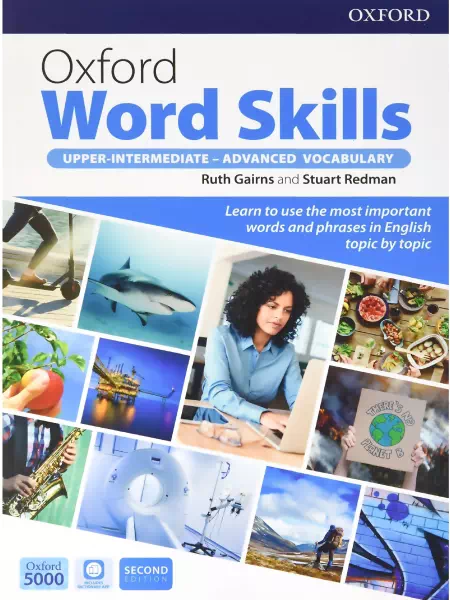Oxford Word Skills Upper Intermediate/Advanced Vocabulary 2nd Edition
Oxford Word Skills Upper Intermediate/Advanced Vocabulary 2nd Edition PDF download

At Upper-Intermediate – Advanced level, the vocabulary includes:
- a wide range of topic areas, e.g. behaviour, competitive sport, medical advances
- a range of concepts, e.g. problems and solutions, time, old and new
- different fields of written English, e.g. literature, science, technical English
- a wide range of phrasal verbs and idioms
- various aspects of language, e.g. compounds, prefixes and suffixes, prepositional phrases
Throughout the three levels the main focus is on high-frequency vocabulary in everyday spoken English, although the higher levels increasingly add more language from different styles of English as well as more figurative use of language.
The selection of vocabulary at each level is based on frequency and usefulness, with
the foundation being the Oxford 3000 or Oxford 5000. These are lists of 3,000 and 5,000
words, respectively, identified by the Oxford University Press ELT Dictionaries team as the
most important words for learners of English. These items have been divided in the Oxford 3000 into four levels in accordance with the CEFR (A1, A2, B1 and B2), and the Oxford 5000 contains additional words at CEFR levels B2 and C1.
- The Elementary level includes many items from A1, but with the majority of items at A2 level.
- The Intermediate level has a focus on B1 items from the Oxford 3000, as well as recycling items from the A2 level.
- The Upper-Intermediate – Advanced level concentrates on B2 items from the Oxford 3000, but also includes additional B2 items and C1 words from the Oxford 5000.
The Oxford 3000/5000 lists are supplemented by the Oxford Phrase List, which contains just under 1,000 phrases considered important for students at each level. The Upper-Intermediate – Advanced word list also draws on topic lists from OUP’s learner’s dictionaries, which identify key vocabulary items across a range of 60 topics. By using the Oxford 3000/5000 alongside the topic lists, we are able to focus on high-frequency vocabulary, but also to include vocabulary that may not have a high frequency overall, but will have great value in particular contexts, e.g. overtake when talking about driving, extinct/extinction when talking about climate change and the danger to wildlife, or self-catering when talking about holidays. By using the Oxford Phrase List, we are also able to ensure the best coverage of both words and phrases at each level.
We have taken great care to ensure that learners will be able to understand the meaning of all the new words and phrases by supplying a clear illustration, a simple definition, or an example of each word or phrase. Learners should be aware that many English words have more than one meaning. They should refer to the Oxford Advanced Learner’s Dictionary 🛈 for information on other meanings.
Format:PDF
Size: 155 MB
Pages:258
Series:Oxford Word Skills
Level:Upper Intermediate/Advanced
Edition: Second Edition
Date:2020
DOWNLOAD
Oxford Word Skills Upper Intermediate/Advanced Vocabulary 2nd Edition PDF
Related Content
Oxford Word Skills Elementary Vocabulary 2nd Edition
Oxford Word Skills Intermediate Vocabulary 2nd Edition
Files are corrupted. Can’t be opened.
uploaded again